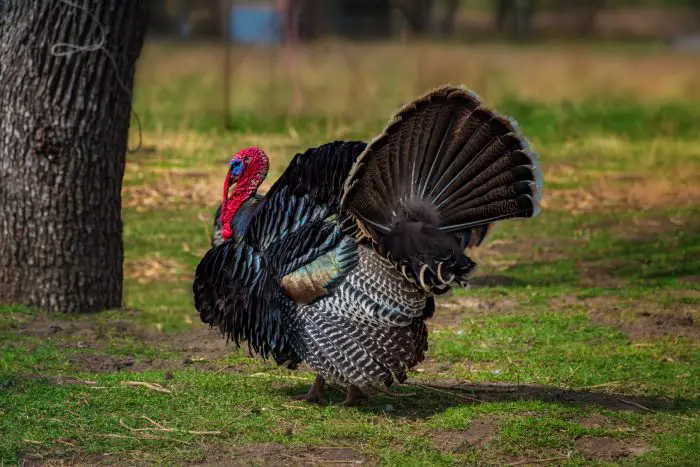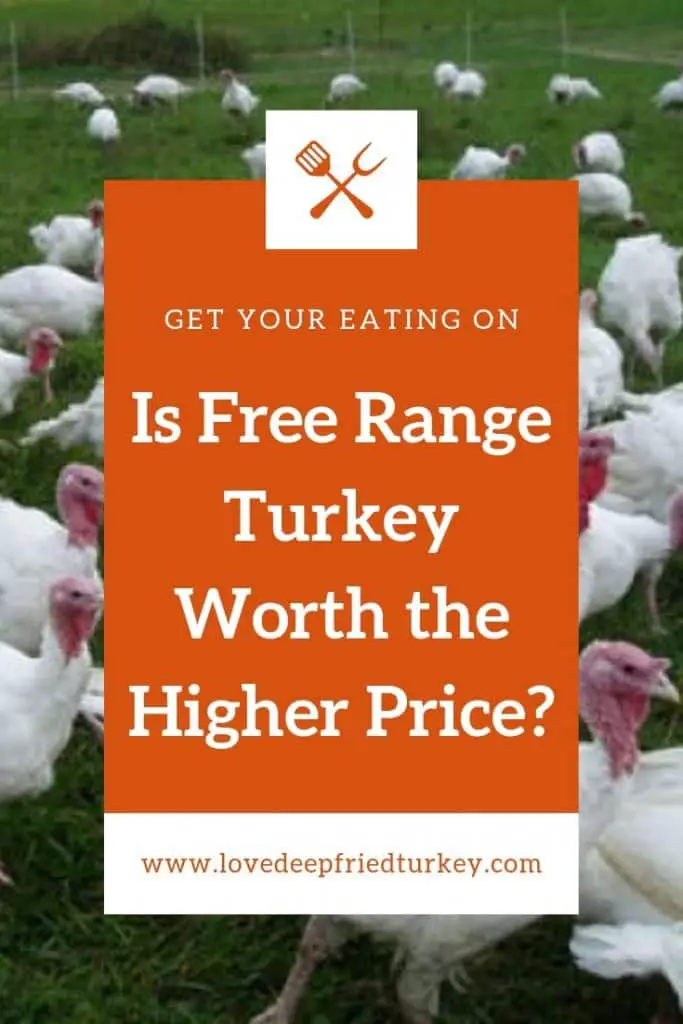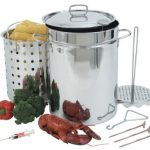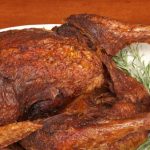
Free range turkey
Is there anything better than your usual home-cooked turkey for Thanksgiving dinner? Some may argue so but it’s usually not the case!
Free range animals are gaining traction as healthier, more appetizing alternatives. And, we can certainly see why because this style of raising turkeys certainly has plenty of advantages over traditional farming methods.
Free range turkeys are raised much differently than your traditional birds. Instead of being confined to cooped-up quarters, they have the ability to roam outside (hence free range).
Their humane upbringing is a huge selling point to many, especially food advocates. But, with such steep prices, is it really worth it to make the switch?
That’s why we’re stepping in. Read on to learn about the advantages and disadvantages of buying a free range turkey. Also keep on reading to find out what the deal with organic turkey is and whether or not you should consider this option.
Advantages of a Free Range Turkey
There are a number of key reasons why you might want to make the switch to a free range turkey. Here are just a few of the most important ones.
#1: No Hormones/Antibiotics for Free Range Turkey
Not only are free range animals raised in a more open environment, they’re also fed much healthier. Farmers do not give these turkeys any hormones or antibiotics.
Often times, animals raised for meat purposes are fed an assortment of antibiotics. It goes without saying- you eat what your meat eats.
This means that you’re ingesting drug-resistant bacteria from everyday sources of protein.
Unfortunately, in recent years, this has become such an increasingly large problem. Now, the FDA has even restricted the use of antibiotics on livestock.
That’s because 23,000 Americans will fall sick and die from these infections each year. 440,000 Americans total will contract an infection from their meat.
Free range animals are a guarantee you’re not consuming other living beings’ antibiotics.
- 4-gal Stainless Fryer - Free Standing
- Two Stainless Mesh Baskets
- Fry Thermometer
- Drain Valve
- High Pressure Regulator w/ Brass Control Valve
#2: Less Likely to Contract Other Diseases
Since free range turkeys aren’t confined to one single, tight space, they’re less at risk for any of their own potential disease.
Non-pastured animals are often subject to tight corners with many others at a time.
This puts your meat at high risk for contracting other serious illnesses. This is also what leads farmers to overuse antibiotics on their livestock.
As mentioned above, free range turkeys have the ability to roam freely outside. When they aren’t confined to one single space, there is less room for illness or disease. Also, this reduces the risk of an infectious disease spreading.
It’s quite expensive for farmers to raise their birds the humane way (which reflects in the cost). However, as with most things in life, you get what you pay for.
If you’re paying low prices for a commodity turkey, you’re risking that it was factory, not farm, raised.
#3: No Mistreatment of Animals with Free Range Turkey
It’s a very sad reality that we see- animals raised for meat are often treated horrendously.
Semi-recently, Butterball, one of the nation’s largest turkey providers, became a prime example. This company, where 30% of the U.S. purchases their Thanksgiving meats from, has been under fire for several instances of animal abuse.
Captured on an employee’s phone camera, countless animals were exposed to horrific cruelty. Butterball employees were seen violently kicking, throwing, and beating the poor animals.
Unfortunately, with commodity turkeys, this happens more times than we’re usually aware of. Being aware of this kind of behavior can truly ruin an entire meal.
Luckily, smaller farms do not have this kind of reputation. They’re well-known for their humane treatment of free range farm animals.
Do Free Range Turkeys Taste Better?
Find out one answer to this important question by watching this short video:
Disadvantages of a Free Range Turkey
There are a number of reasons why you might want to stay away from free range turkeys. Here are just a few of them.
#1: Cost
The most obvious reason you’d opt against a free range animal is the cost. Purchasing one of these guys will set you back quite a bit more than their counterparts.
In some cases, free range turkeys have been as much as 8.5x the cost of the traditional bird.
But, on average, a free range turkey costs roughly $6-$7 per pound. A commodity turkey, on the other hand, is much lower with prices around the $1.40 mark.
If you’re looking to budget, a free range bird may not be the route to go. (However, many do argue that they’re worth the splurge.)
- Aluminum basket with patented drain clips
- Oil drain Valve for easy clean-up
- Dishwasher safe components (pot, basket, lid, drain valve)
- Designed and tested to meet commercial standards.Magnetic breakaway cord for safety
- Magnetic breakaway cord for safety
#2: The Name is Potentially Deceptive
Yes, I did just spend a lot of time talking about how great it is that free range turkeys roam freely on their farms. But, there is quite the stipulation to this definition.
Per USDA standards, to be a “free range” bird, your animal has to have access to the outdoors.
Farmers don’t have to have their animals go outside a certain amount of hours in the day. They don’t have to get a certain amount of exercise. They don’t even have to be living outside of a crowded coop.
As long as the birds have access to walk in and out for SOME period of the day, they’re considered free range.
Now, luckily a good majority of livestock farmers are ethical. If they label their turkeys as “free range”, then it’s what you’d expect. In our experience, there is almost nobody trying to pass off regular turkey as free range turkey.
But, in some cases, the birds might not be very free range after all. This is why it’s good to be as informed as possible about where you buy your poultry.
The Truth Behind Free Range Turkey
Check out this short video for more details about whether or not free-range turkey is the right choice for your next family that next big holiday.
What about Organic Turkeys?
Along with free-range, you’ll often the term “organic” thrown around when it comes to turkey, chicken or other kinds of meat you may find at your local supermarket. Certified organic turkeys are raised according to strict protocols and the main requirement is that they’re fed only organic food.
However, they may or may not be free range. Some organic turkeys are raised in the same small cages that the regular turkey you might buy at Thanksgiving is.
In addition, most free-range turkeys are also organic but this isn’t always the case. Check with your grocer or read the label carefully to find out the specifics.
Free Range vs Organic Turkeys
Find out the key differences between the two and find out what these terms actually mean in practice:
Final Showdown, Commodity, Organic or Free Range Turkeys?
Well, that’s certainly still up to you as to which turkey you want to buy for that next big Christmas or Thanksgiving feast.
Purchasing a free range bird clearly has its benefits. You’re more likely to buy from a trusted source who has raised the bird with moral standards. And, organic turkeys do certainly taste better as they’ve been given a higher quality feed.
However, for many, the holidays are already expensive enough. It isn’t an easy switch to free range and/or organic animals, as the cost difference is quite noticeable.
When it comes down to it, there is no right or wrong answer. But, you can make a more educated purchase by looking into where you buy your meat from.
Just because you usually shop for free range animals, doesn’t mean that’s what you actually get. Contact your local farmers or distributors, because as we mentioned above, labels can be quite deceptive. This is also true with things labelled as “organic” as standards vary from state to state and country to country.
While You’re Here…
Are you looking to make the most of your turkey dinner? Well, you’re in the right place.
At Love Deep Fried Turkey, we know good cooking. Nothing beats the taste of a deep-fried turkey — free range or commodity.
Impress your guests with the crispy, juicy meat that comes from our deep fryers. Click here to learn about our products and which one may be best for you!
- 44 Qt. (11 Gallon) Stainless Steel Oversized Turkey Fryer With Basket
- Vented Stainless Lid and Insulated Glove Great to Fry Boil Brew Steam
- Aluminum Perforated Poultry Rack/Grab Hook and Skewers for Chickens
- 12" Thermometer 50°-750° & Stainless Seasoning Injector You Get What you Pay For
Now that you know all the details you need to know about this topic, the next question is what kind of turkey fryer to get! Find out more: Indoor vs Outdoor turkey deep fryer.
Free Range Turkey FAQs
There are a number of common questions that people have about organic and free-range turkeys. Here are the answers to some of the most popular ones.
What is a Free Range Turkey?
A free range turkey means that it has had access to the outdoors and was able to move around. In some cases, it means that it could forage for its own food instead of being only fed by the farmer. However, not all free range turkeys are also organic so read the label carefully.
How Much do Free Range Turkeys Cost?
In general, free range turkeys cost 2-3x more than regular turkeys do. However, if they’re also organic and have been raised entirely by being able to forage for their own food, they can be even more expensive than that.
How do I Cook a Free Range Turkey?
In terms of how to cook a free range turkey, it’s the same as a regular turkey. You can roast it in the oven or cook it in a deep fryer.
Do Free Range Turkeys Taste Better?
Because free range turkeys have been able to move around and access outside spaces, many people believe that they taste better than conventional turkeys. In some cases, they’ve also been fed better quality feed or allowed to forage for their own food and in this case, they would certainly taste better.
Are Organic Turkeys Worth It?
Organic turkeys cost at least double what regular turkeys cost but are they worth it? Once you find out what’s in normal turkey and what kinds of things they’ve been given to eat, you’ll likely be willing to pay the extra cost!
What is a Heritage Turkey?
A heritage turkey is older than regular turkeys at the time of slaughter (26-28 weeks vs. 14-18 weeks). This means that the maet is sturdier and more flavourful. However, they are also quite a bit more expensive which is the main drawback of heritage birds.
Have your Say about Regular Turkey vs Free Range Turkey
What are your thoughts about these two kinds of turkeys? Is it worth it to spend the extra money on a free range one? Or, not so much and you’ll just pick up a regular one from the store?
Leave a comment below and let us know what you think. We’d love to hear from you.
Also be sure to give this article a share on Facebook, Pinterest, or Twitter. It’ll help other turkey enthusiasts, like yourself find this useful resource.

What is free range turkey? Find out here!
Last update on 2021-08-05 / Affiliate links / Images from Amazon Product Advertising API







